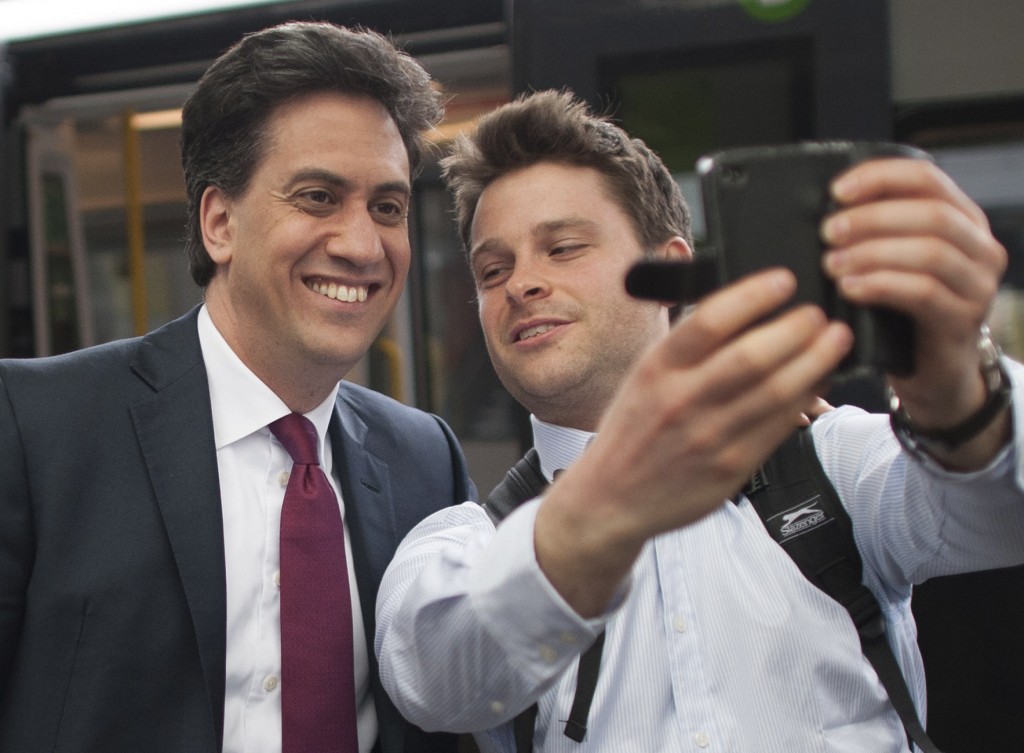Social media a key battleground in Britain’s election

Britain’s Labour Party leader Ed Miliband, left, poses for a picture at Nuneaton railway station before unveiling his party’s new National Health Service campaign posters in Nuneaton central England during his General Election campaign tour Thursday April 23, 2015. Britain’s most unpredictable general election in decades is Thursday, May 7, with polls showing the two biggest parties Labour and the Conservatives running in a virtual dead heat. The election could decide issues such as whether Britain will remain a member of the European Union, whether it will close its doors to immigrants and whether it will continue with the austerity programs. AP
LONDON— Once, election campaigning meant knocking on doors, organizing meetings and licking stamps. Now it also includes honing hashtags, rallying retweets and clicking “like.”
In Britain’s close-fought races for Parliament, the battle online may be as important as the battle on the ground. It’s certainly more personal.
Most political advertising is banned in Britain, and strict rules govern election broadcasts. But these don’t apply to the Internet, so political parties are pouring money into YouTube, Facebook and Twitter campaigns — including U.S.-style attack ads rarely seen before in Britain.
On Conservative social media, Labour Party leader Ed Miliband is a tax-raising reckless spender in the pocket of Scottish separatists. For Labour, Conservative Prime Minister David Cameron is a cowardly “invisible man” because he refused to take part in several televised election debates.
Carl Miller, research director of the Center for the Analysis of Social Media at think-tank Demos, says the big political parties are pumping resources into “dominating the digital landscape” as never before.
“The rise of digital campaigning is in reaction to something fundamental — the electorate are increasingly turning to digital spaces for their information and opinion,” Miller said. “For young people, 34 percent of them say social media will influence their vote, which is huge.”
British elections are not always genteel, but they are well regulated. Rules state that publicity material “must not contain a false statement as to the personal character or conduct of another candidate,” and paid-for TV and radio ads are barred. Instead, the parties are allocated a set number of election broadcasts based on their level of support.
Online, however, the parties can be as prolific — and as nasty — as they want to be. Humor, sarcasm and innuendo are a growing part of the political vocabulary, as parties turn their opponents’ gaffes and contradictory statements into online images and mash-ups.
Conservative ads have depicted Miliband as an economically reckless socialist who would lead the country into chaos. One Conservative Facebook post says Britain under Labour would — horreur! — “look increasingly like France,” with a socialist government and sagging economy.
Labour videos depict Cameron as a servant of the rich making promises he can’t pay for.
Much of this online campaigning has been inspired by the U.S., where social media helped Barack Obama win and keep the presidency in 2008 and 2012. Britain’s biggest parties are both being advised by former Obama gurus — Labour by onetime adviser David Axelrod, the Conservatives by ex-campaign manager Jim Messina.
Traditional campaign billboards have largely been replaced with ads on sites like Facebook and YouTube, which allow the parties to target messages at specific subgroups of voters.
Inside parties’ headquarters, digital teams type, swipe and click away, offering instant responses during debates and other big election events.
Labour and the Conservatives hope a savvy digital strategy can give them the edge in a May 7 election that polls suggest is too close to call. Miller said that if the election were decided by Facebook likes, the Conservatives would win. Labour is more successful on Twitter, and has the advantage of younger supporters.
“There is a huge pool of young activists working on behalf of the Labour Party this time around,” said social media consultant Ben Stockman, who helped run a grass-roots online campaign for the Liberal Democrats in the 2010 election. “In terms of tactics, digitally Labour are far ahead of the game.”
It’s far from clear whether retweets and “likes” will translate into votes. But Miller says social media has already changed the tenor of British democracy. He said it is creating “a whole new kind of political message” — immediate, often satirical, and created by meme artists and Photoshop satirists.
Stockman believes social media can make politics “a little more democratic and a little more transparent.”
“You can’t avoid an instant reaction when you say something stupid,” he said.
But Paul Greenwood, research and insights director at agency We Are Social, thinks digital revolution is a long way off. He said Britain’s politicians still have a “broadcast mentality,” in which online messaging is a one-way street.
“I think it’s a huge missed opportunity,” he said.
“A huge proportion of the electorate are disillusioned and apathetic and don’t vote, and it’s mostly the young ones. They are all spending a lot of their time on social. If someone had one good idea about how to reach out to them and talk to them in a language they understand, how to make politics relevant to them on social, it would be huge. But I’m not seeing that.”